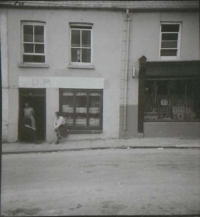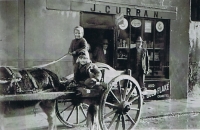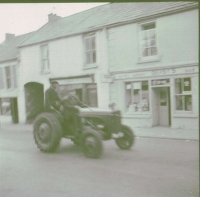The tragic tale of Mealane Ni Auliffe told in the words of Edward Walsh, the Poet of Duhallow.
Tis night and the moon from her
star-clad height
Sheds her mantle of silver hue
o’er Clonfert’s green graves,
And all sparkling bright Daloo in
her gleam
Beams a sheet of light where
murmur its waters blue.
In the gloom from afar o’er the
soothing scene -
The tall cliff and wavy wood.
And mournful and grey are the
rude rocks seen:
So heaves the green turf in
huge mounds between
Where Castle McAuly stood.
Here frowned the dark turrets in
lordly pride;
Here smiled the gay chieftain’s
hall.
The clansmen here marshall’d in
order wide;
When war-fires high blazed on
the mountain’s side,
For battle at glory’s call.
Here ne’er shall the string of the
clairseach wake,
The songs of the hall are o’er.
No more shall the voice of the
victor break;
When home o’er the mountain
their wild way take -
The kern and crahodore.
The clansmen who battled with
Saxon foes;
the chief of the lordly dome;
The bard at whose call the stout
clansmen rose;
In death undistinguished all
calm repose.
They are gone to their silent
home.
Lo! Yonder where moss-grown
the gravestones lie,
MacAuliffe sad sought the tomb.
He died not in battle by
victor high;
Heartbroken he yielded his
latest sigh
For Meelan his daughter’s
doom.
Daloo! While there glidest thy
groves between,
Shall the maids of thy sunlit
glade
Twine horror-fraught tales of
the nuptial scene,
With the olden lays echoed
through woodland green,
For Meelan, the gold-haired maid.
And mild as the lambkin that
crops the the lea,
And pensive as cowslips pale,
She oft sought the valley alone
- for she
Was woo’d by a chieftain of high
degree
In yonder dark lonely dale.
O’Herly was gallant and brave
and gay;
And chronicles ancient tell,
That Malachy bid his fair
daughter say
Who’d kiss her pure cheek on
the nuptial day -
Her choice on O’Herly fell.
Fond pair! You have woven in
fancy’s loom,
Sweet garlands of pleasure gay;
Dark destiny withers your
garlands’ bloom,
Yet could beauty, could merit,
revoke the doom.
Not yours were this plaintive lay.
The glad nuptial arrives
and lo
the high notes of joy rebound;
The priests are in waiting, a
glorious show -
The bards raptured voices all
sweetly flow,
To join the wild harps soft
sound.
As blooms the young rose in the
sunbeams clear
With bright pearly dew bespent,
So fair Meelan shone, through
the smile and tear
When the young chief soothed
each maiden fear
as they to the altar went.
How glorious the pomp of the
lordly train,
that leads the young pair along;
What silver-shod coursers proud
paved the plain -
Clonfert never saw, in her
sacred fame,
so gallant, so fair a throng
To view the proud pageant the
deep crowds press’d,
Warm hearts in hot wars’ urmoil,
Whose lips warmly praying, the
bright pair bless’d,
As they went where the priests
were in surplices dress’s
to the altar along the aisle.
The hollow wind whistled the
tombs among,
The owl from her ivory tower,
her harsh nightly notes on the
daylight rung,
When young Meelan whispered,
with faltering tongue,
Consent to the nuptial power.
The marriage ring wax’d,as the
moonbeam pale,
And deep was her heart’s
dark fall,
As the loud tempest gahtered
adown the dale,
And the bride and the bride-
groom sad sought the vale,
that led to MacAuliffe’s hall.
The hollow wind’s whistle, the
owlet’s cry,
The marriage ring’s paly glow;
The gloom of the moment, the
unconscious sigh,
The lowering dark cloud of the
boding sky,
Proclaim a sad tale of woe.
The sun hath gone down o’er the
mountain sreep,
And tinges its glades with gold;
The voice if the banquet is loud
and deep -
The last and latest that hall
shall keep,
Clanawlwy shall e’er behold.
Poor bride and the handmaids
thy chamber spread,
And show the gay fragrant
flower;
Thou wilt press with thy lover
no nuptial bed -
Borne off by enchantment so
drear and dread,
From bridegroom and bridal
bower.
The revelry rose on the night’s
dull ear,
The vaulted hall loudly rung -
When Meelan discover’d in
wildest fear,
A stranger was seated beside
her near,
As ‘twelve’ the strict warder
sung.
His flowing locks mock’d the
dark raven’s plume,
His carriage commanding high,
Bespoke the proud chieftain;
but silent gloom
O’erspread every bosom
around the room
Though none knew the reason
why.
His bright eye keen flash’d
with unearthly fire,
No mortal might its glow;
The guests of the banquet
with cold hearts retire,
The bard’s fingers ceased o’er
the trembling wire,
His presence such fears
bestow.
Ye guests of the banquet
surcease your dread;
Right courteous the Stranger
tall
He fills o’er the table the wine
bowl red,
He pledges the bride with low-
bending head -
The bridegroom and chieftain
and all.
He leads the young bride in
the circling dance,
Most regal his robes were
seen;
The banquet guests viewed
him with eyes askance -
The bride, oh! She trembled
beneath his glance,
Though graceful and gay his
mein.
How quick gleam her steps on
the marble floor,
And gentle her light foot
sound
In the hall which her light foot
oft trod before,
As she led her gay handmaids
that marble o’er
To move in that mazy round.
‘Tis done – when the murmurs
applausive ceased
The chief led the blooming
bride
Where Malachy ‘mid the high
chieftains placed
Presided supreme o’er the
nuptial feast,
Then sat by the maiden’s side.
“Thy light step, fair bride” the
dark stranger said,
“But echoed the music’s sound;
With fair blooming beauties
the dance I’ve led -
Their charms would have van-
ished, their light step fled,
Wert thou in the mazy round.
I have young maid and her
face is thine,
And thine are her tresses long,
And thine is her dark eye of
light divine -
And Oh! If thou listen to
strains of mine
I’ll sing to my fair a song.”
She bow’d – and he raised
some enchanted tone
Ne’er warbled by mortal
tongue.
If golden-harp’d seraphs to
earth had flown,
The voice of the stranger
would seem their own,
And these were the strains
he sung: -
THE SONG OF THE SPIRIT
Thou knowest where yon moun-
tain uprears its huge head,
Where the hoarse torrent roars
down its rude rocky bed,
There stands my bright palace -
high dwelling of air -
And the bride of my bosom shall
smile on me there.
Where the hues of the rainbow
all glorious unite,
Festooning the hall in gay
vapours of light,
Whose diamond-starred pave-
ment now sparkles in sheen,
Far brighter than gems, the
deep grottos of Lene.
The soft bridal bed my beloved
shall share,
I’ve plucked from the perlons of
spirits of air.
And the fairies of ocean by
strong spell beguiled,
Shall soothe her to slumber with
melody wild.
I know where the waters of
loveliness flow,
Whose pure draught can beauty
immortal bestow;
And the rose of her cheek, and
the snow of her brow,
Shall through the wreck’d ages
as peerless as now.
My chariot the wild winds, my
pathway the sky,
O’er wide earth and ocean
unfettered I fly;
And my bright bird of beauty
can wing her quick way
On the zephyr’s soft pinion, as
light fancy may.
I know where the diamonds of
brightness have birth,
In the caves of old ocean and
dark womb of earth;
I’ll choose for my fairest the
rarest of all,
To deck as she pleases the
crystal-built hall.
‘Tis the night of my bridal – I’ve
passed it with you;
The morning star blazes – ye
chieftains, Adieu!
When yearly this dark night of
wonder shall be,
Remember the bridal; and
think, think of me.
High lord of the castle, dark
chief of the wold,
The banquet of feasting I leave
but, behold!
I’ll snatch to my bosom the maid
of my vow,
McAuliffe’s bright daughter,
that maiden art thou.
‘Tis vain, O rash bridegroom
nor tempt my high power
I’ve decked for Meelan the
gay nuptial bower;
My train are in waiting,
impatient I fly,
My chariot the wild winds, my
pathway the sky.
Then rose through the castle
the wild guests fright,
As his strong arm he twined her
round.
And winged through the wide
yawning roof of his flight;
But ne’er was the bride, since
that fear-fraught night,
Or the mysterious stranger,
found.
To yonder rude cliff called from
Meelan’s name,
Through many an olden day -
Where stood the gay hall of
enchanted fame,
Invisible save to the wizard’s
beam -
The mountain-sprite bore his
prey.
At night when cottagers calm
repose,
And silent the grove and green,
Fair Meelan is oft at the dark
heat’s close,
While swells the sad tale of her
fate and woes,
Near her rock of enchantment
seen.




